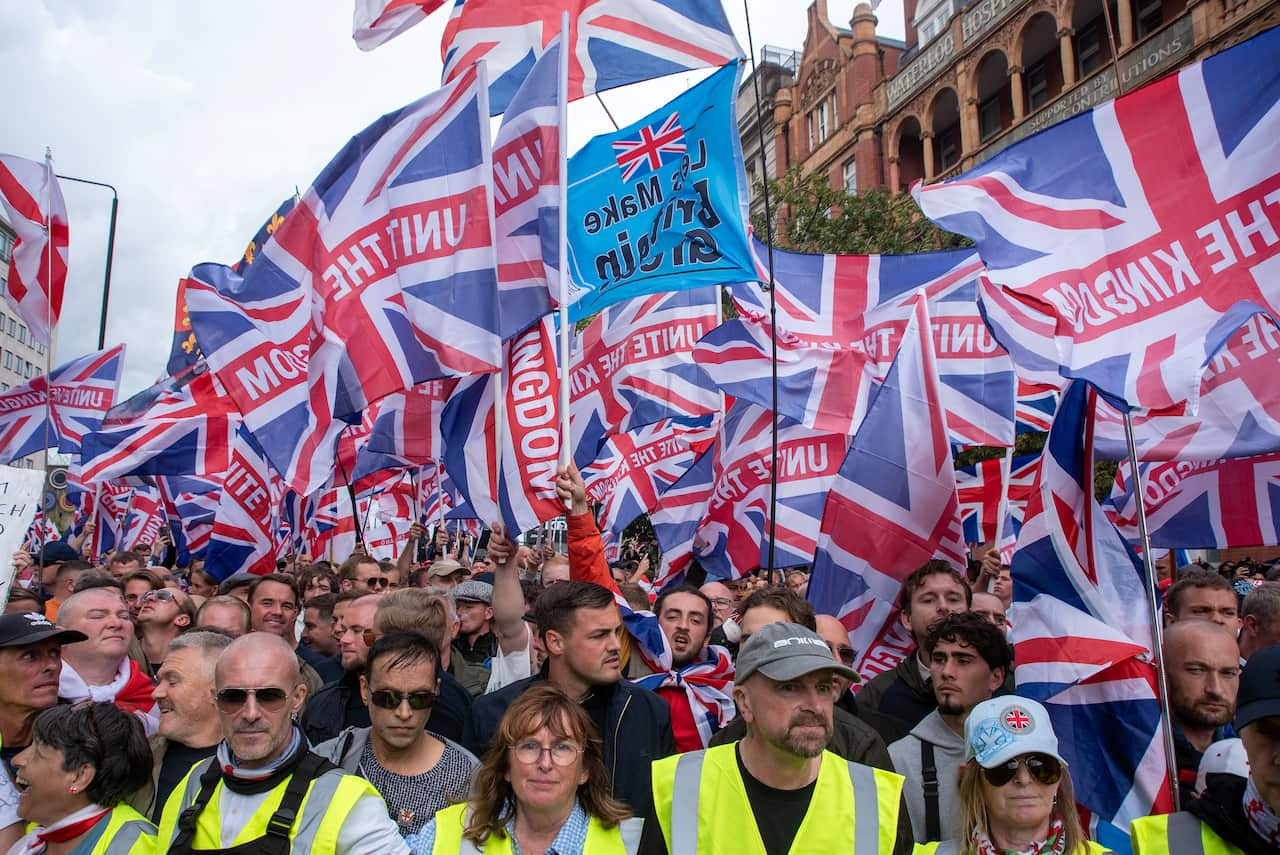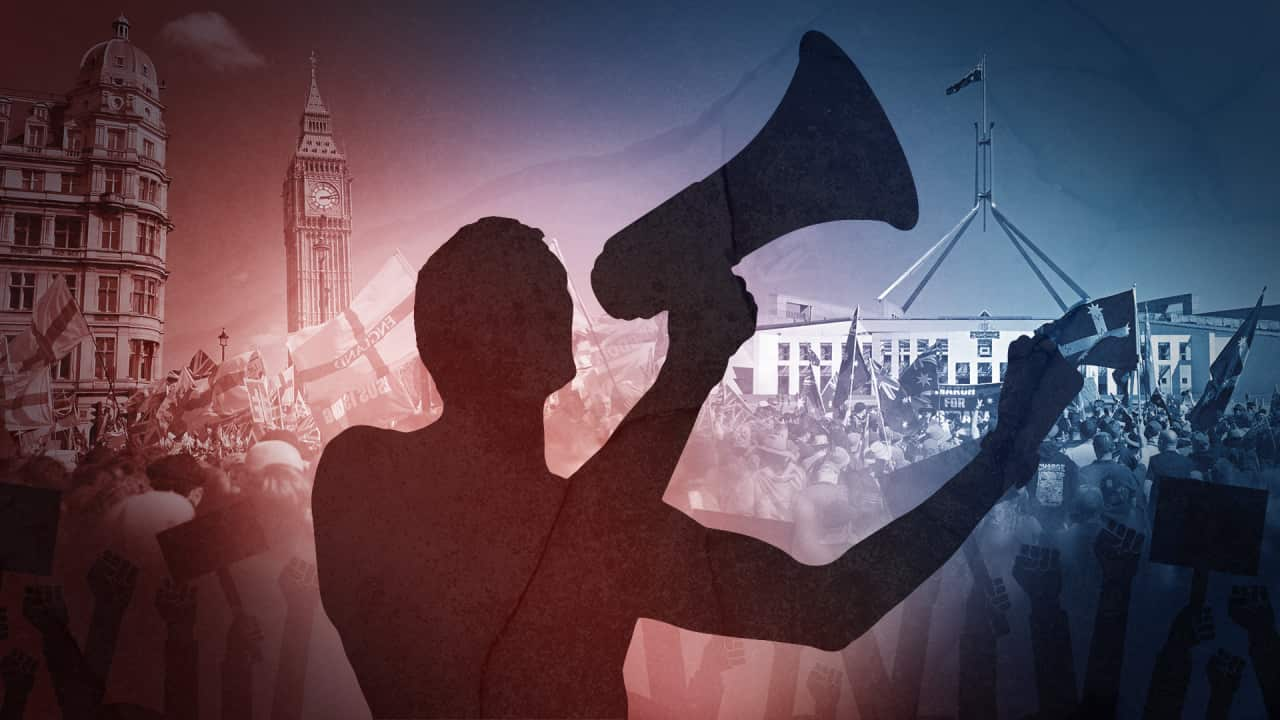Experts say there are a number of driving forces behind far-right, anti-immigration mobilisation in the UK and Australia in recent months but the rallies themselves are "not particularly exceptional".
More than 100,000 anti-immigration protesters marched through the streets of central London on Saturday under the banner of 'Unite the Kingdom' in one of the country's largest ever far-right demonstrations.
The marches, organised by the anti-immigration, anti-Islam activist Stephen Yaxley-Lennon — known as Tommy Robinson — brought highly charged scenes and police officers described being physically assaulted and hit by flying projectiles.

X owner Elon Musk spoke via video link to the crowd calling for a dissolution of the UK government and warning protesters that "violence is coming" and saying they need to "fight back" or die.
The UK has seen many anti-immigration protests staged in recent months in London, Bristol and Birmingham, including some staged outside hotels housing migrants.
Red and white English flags have proliferated along streets and been painted on roads. Supporters call it a spontaneous campaign of national pride, but anti-racism campaigners see a message of hostility to foreigners.
Anti-immigration sentiment is also reflected strongly in political opinion polls in the UK at the moment, with a recent survey finding populist leader Nigel Farage's Reform UK party would become the largest political party if an election were to be held now.
Australia has also seen a number of anti-immigration marches in recent weeks.
On Saturday, protesters marched in capital cities calling for an end to "mass migration". The lead organisers of that event posted a notice on their website distancing themselves from any connection with Tommy Robinson or his views.
Two weeks earlier, there were the nationwide 'March for Australia' rallies, which were attended by members of the neo-Nazi National Socialist Network and allowed neo-Nazi leader Thomas Sewell to address crowds in Melbourne.
The March for Australia rallies also received notable support from far-right figures, including Tommy Robinson and Elon Musk.
So, what is driving these movements?
'Scapegoat' groups
Callum Jones, a political extremism researcher from Monash University, told SBS News grievances such as economic and social uncertainty play a role in political mobilisation for the far right and these groups capitalise on issues such as housing and the high cost of living to gain momentum.
"In the same way, we saw large-scale political mobilisation around the COVID-19 period where you had a lot of people turn out [to protests] because of perceived infringements on civil liberties and they were turning to protest things like mask mandates and vaccine mandates," he said.
Jones said far-right politics focus on grievances and perceptions around "entitlements or privileges or access to resources that are being taken away" and "certain groups are scapegoated as being the people who have taken away those previously accessible resources or privileges".
The role of social media
Experts say the momentum of far-right movements is also being facilitated significantly by online networks.
Far-right groups use social media platforms to advocate for their cause, show support for similar organisations and recruit new members, with young people particularly vulnerable to extremist propaganda online.
ASIO boss Mike Burgess has referred to the internet as the "world’s most potent incubator of extremism" and "social media is the world’s most potent accelerator of that extremism".
On Monday, Prime Minister Anthony Albanese spoke about the recent anti-immigration marches, saying political discourse has become "more negative" and "more aggressive" and blamed social media for this trend.
"It pushes people — the algorithms push people to extremes, whether they be extreme left or extreme right," he said.
In a recent piece he co-authored in The Conversation, Jones argued that there are growing transnational links between far-right movements that see themselves as united "over the defence of so-called 'Western Civilisation', opposition to mass immigration" and the "preservation of white identity".
Jones told SBS News that social media makes it easier for far-right actors to disseminate propaganda and break down geographical barriers.
He also said the spread of far-right ideologies globally online is made easy because the broad tenets of the ideology are easily adaptable to local issues.
"Something like immigration — it's a very broadstroke concept but it can be localised into a national context very easily."
Dr Liam Gillespie, a researcher in far-right political violence from the University of Melbourne, agrees that social media is amplifying the messages of the far right and creating "hyper-connected nationalist groups that imagine themselves being united against" mass immigration, Islam or resource scarcity.
However, he warned against simply pointing the finger at social media for leading to political polarisation and says it can not amplify sentiments that do not already exist.
Gillespie also said there have been long-established transnational links between far-right organisations.
"These groups have also been connected in their own way — we have long histories of white supremacist groups and white supremacist militia in the US being connected to groups in Australia or the UK or South Africa," he says.
"It's just those sorts of connections are accelerated now."
Normalisation in politics
Normalised anti-immigration rhetoric in the government and media has also contributed to these far-right movements, Gillespie said.
While it is tempting to point to extreme actors as the catalyst for far-right movements, Gillespie believes "exclusionary politics" can lay the groundwork for "people to then take to the streets and then engage in political violence, which can seem as though it's just popped up out of nowhere".
Anti-immigration discourse such as demonising international students, offshore detention and even political language such as referring to refugees and asylum seekers as "boat people" can all contribute to these movements, Gillespie said.
'Not particularly exceptional'
However, Gillespie also stressed that the far-right, anti-immigration rallies that have been taking place recently are far from exceptional in recent history.
Gillespie said many of the same actors who have led the recent marches have established histories of engaging in this kind of behaviour in recent decades.
For example, Tommy Robinson was the former leader of the far-right and Islamophobic English Defence League, which was active in the UK from 2009 to around 2016 and organised frequent demonstrations.
While Gillespie said it seems these movements are "at a juncture" he also said it is important to recognise that these marches are "not particularly exceptional" in the historical context of events like the 2005 Cronulla riots in Sydney and the 2017 Charlottesville rally in the US.
Jones agreed and said that while the UK march was large, there is a "cyclical" nature to far-right protests. He also stressed that suggesting this moment in the far-right movement is unique can be dangerous.
"These groups need to make it seem as though their ideology is not fringe and extreme but rather is mainstream and palatable and growing in terms of its acceptance within mainstream society — because it's easier to get someone to agree to something if they don't think that they're taking on an extreme stance."
With additional reporting by the Reuters news agency.
For the latest from SBS News, download our app and subscribe to our newsletter.

